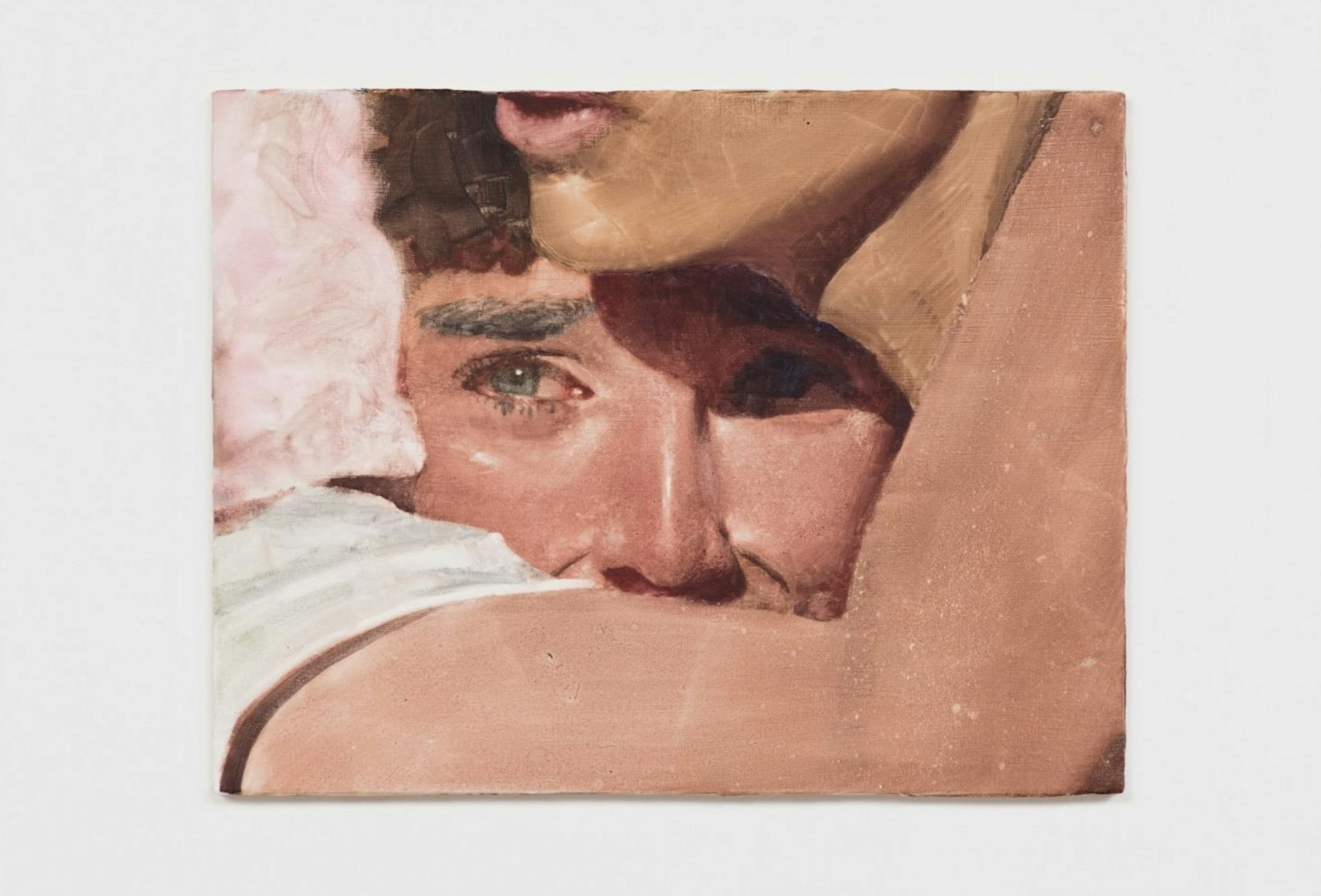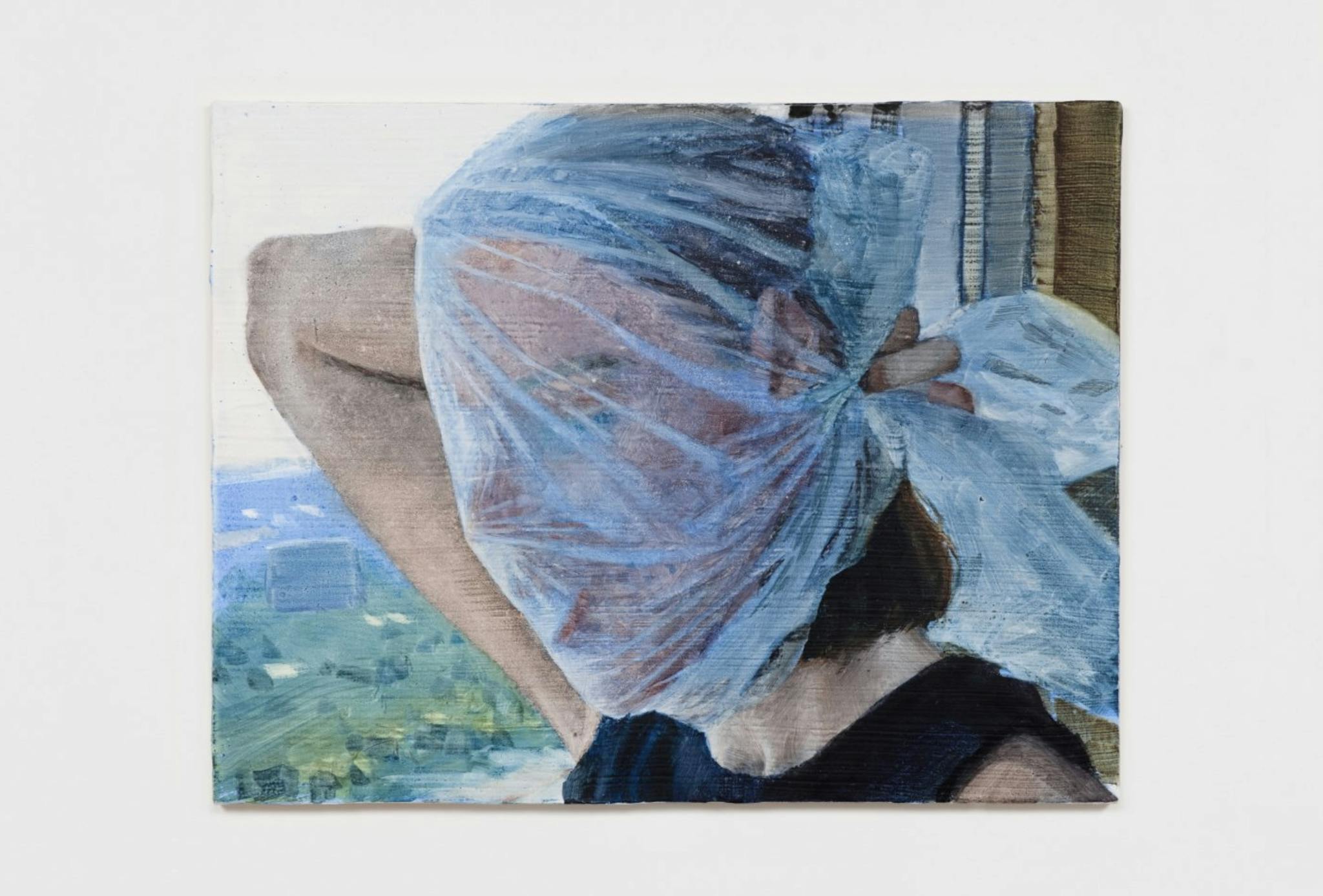Pure Emotional Blackmail: Joseph Yaeger
March 2022
Who is the couple embracing behind the glass, glazed with pouring rain? Call it cinematic—you won’t be wrong. But try to pin the image down any further, and you’ll end up taking what the artist considers a deep dive into the history of color cinema, winding up with nothing more than powerful memories, water running through your fingers.

Yaeger’s paintings are hyperspecific, based on frames from YouTube home videos and other family memorabilia—and instantly generic, abstracted onto a gessoed plane until they’re unrecognizable. For the last few years, the artist has worked in watercolor on a repellent acrylic ground. The actual image is thin, almost as gossamer as light hitting a screen. Any texture or brushstroke you see underlies and deflects the color on top.
Yaeger arrived at this process accidentally, or at least found the magic medium within the options he’d accumulated, maybe unconsciously, in his studio. One day, in the course of applying found digital tableaus to paper, he used his last sheet and picked up a canvas instead. Where paper or linen welcomed the pigment, gesso fought back; the watercolor beaded on the surface. Yaeger describes it as an “argument” between materials with different temporalities. 1 This suited his attempts to capture the fleetingness of film and video on still, antique media. Paper soaks up the image and can only be muddied, turned brown or gray, never really wiped clean. The gesso, though, all too readily sheds its thin coat
of color.
The process ends up being reductive rather than additive—starting dark and easing away pigment to find the highlights. Incidentally, this is how projected film works, too: what you see on the screen are shadows. Yaeger’s paintings often bear intensely poetic titles—and his shows are organized around opaque but romantic themes. In a 2020 exhibition at Project Native Informant in London called, simply, The Writer, small canvases bore the weight of phrases drawn from contemporary and modern literature. A painting of someone rubbing their eyes in the blurry bottom corner of a mirror is titled Autofiction (2020); a face covered in bandages, ominously: Dress Rehearsal (2020). In That thing Strand said about a field only with dirt (2020), a pair of eyes revealed in a mound of soil as if buried alive—the title references a poem by Paul Strand: “In a field / I am the absence / of field.” 2 These citations seem to specify the otherwise spectral images—their emotional impact (Barthesian punctum, no less) survives their watery delivery.
The artist insists, to the point, that he is painting a screen—the thin part of the image. He’s trying to represent “cinema in general,” not any specific film. He wants to “completely avoid the icon.” Yaeger says that, as he trawls the internet, hunting for a “spike of feeling,” he’s “not interested in anything that exists in someone’s head already.”
The images strike at the crux of an action, the moment right before or right after something happens, or—maybe—the instant when it’s happening. You can almost sense either side of the given frame. But if the process of scraping footage is deliberate, making the paintings is intuitive. The results of this careful, alienating process approach a kind of pure emotional blackmail. Fat flakes of snow, burning in a car’s headlights, fly at the windshield or picture plane; a woman presses the body of a dead hare; a hand closes the eyes of a corpse through a gauzy veil. Power Ballads, a show held in 2020 at VO Curations in London, laid the melodrama on thick: the titular painting shows a couple embracing, clutchingly, desperately, through a rain-glazed pane of glass. Yaeger seeks out images that play these chords at a distance, without context. Their verisimilitude is emotional. He doubts, in a way, the possibility of painting ever amounting to anything “real.” In other words, what’s real is the spike of feeling.
In this bleary, reluctant cinema, where images feel both familiar and unclaimed, biography can adhere to the screen. Joseph Yaeger’s next show, at Antenna Space in Shanghai, includes a written memoir of sorts, insofar as a memoir can ever be factual. Presumably, it tells the story of the artist’s L.L. Bean upbringing in Helena, Montana; of following the love of his life first to Los Angeles, then London, where they still live. It probably also mentions the stages of his art career, that journey, from a stab at film school to an illustration degree at RISD and then graduate studies in painting at the Royal College of London. It might even discuss the period during which Yaeger forswore painting and focused on writing fiction.
The memoir is interposed with fictional emails from a woman named Julia, who makes anti-cinema. Her theories are also Yaeger’s. The paintings he’s made for the show are against duration, an application of anti-cinema: twenty-four canvases, horizontal, proportioned 16:9 like a film frame, and the whole series like a single second of film projected at sound speed. Of course, there’s an order in which they were painted; they’ll be sequenced on the wall. But the images aren’t sequential, or even related, except as “cinema”—flipping through them wouldn’t produce an animation but instead a diffuse film history, its tropes stripped down so far that they float.
“The text doesn’t explicate the paintings,” Yaeger says. “They run concurrent, like twin rails.” Like the twin rails of the railroad at the film camera’s invention? “They create stability.” Heading off any slippage left or right, the rails—text and image, program and painting—also allow a propulsive forward motion. Yaeger paints, and writes, but what he’s really constructed is a machine for escaping conscious thought—to flee into the arms of intuition. To just work.
Travis Diehl is a freelance critic and online editor at X-TRA. His writing appears in Art in America, frieze, the New York Times, and the Baffler, among others.
